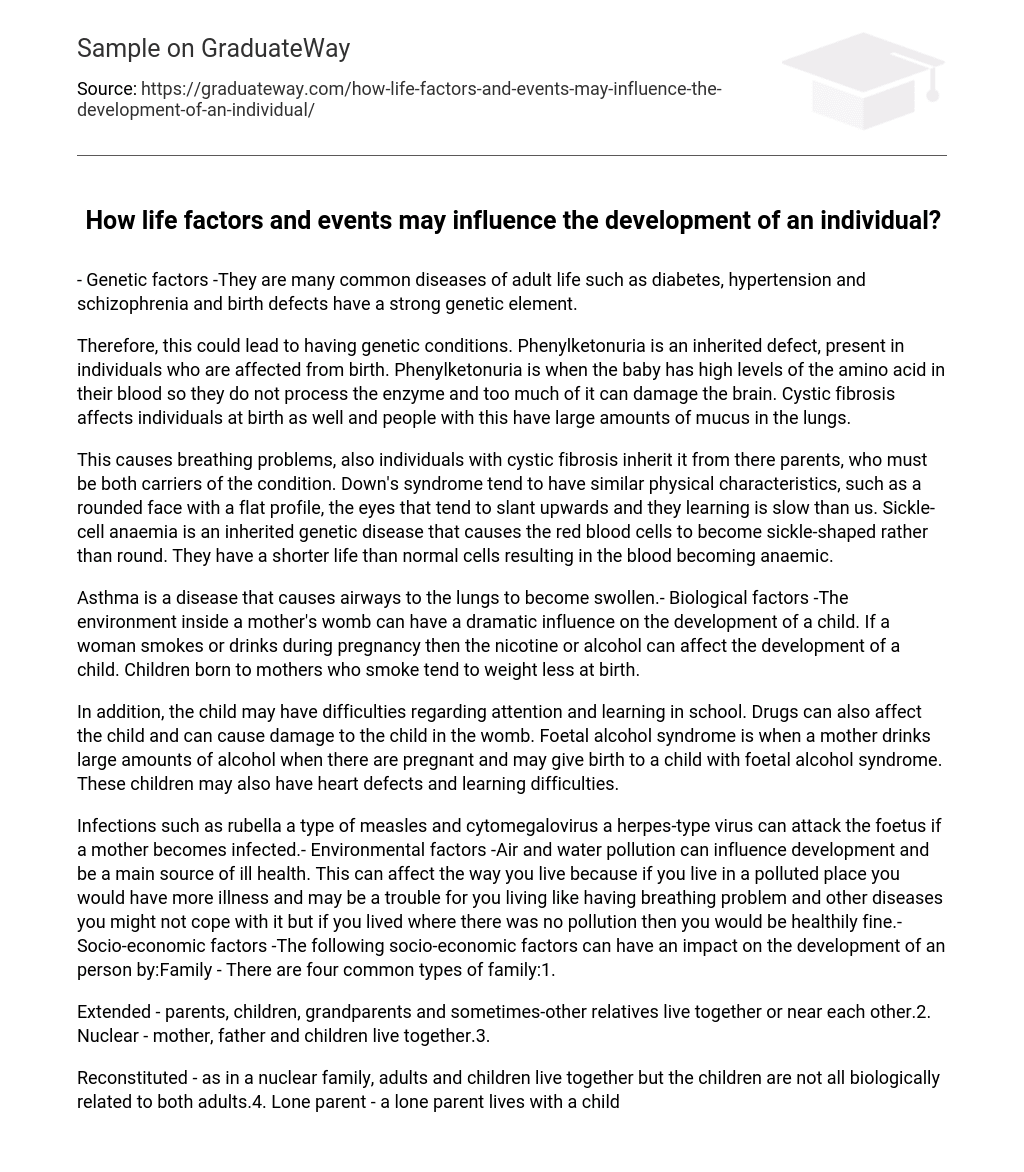Genetic Factors
They are many common diseases of adult life such as diabetes, hypertension and schizophrenia and birth defects have a strong genetic element.
Therefore, this could lead to having genetic conditions. Phenylketonuria is an inherited defect, present in individuals who are affected from birth. Phenylketonuria is when the baby has high levels of the amino acid in their blood so they do not process the enzyme and too much of it can damage the brain. Cystic fibrosis affects individuals at birth as well and people with this have large amounts of mucus in the lungs.
This causes breathing problems, also individuals with cystic fibrosis inherit it from there parents, who must be both carriers of the condition. Down’s syndrome tend to have similar physical characteristics, such as a rounded face with a flat profile, the eyes that tend to slant upwards and they learning is slow than us. Sickle-cell anaemia is an inherited genetic disease that causes the red blood cells to become sickle-shaped rather than round. They have a shorter life than normal cells resulting in the blood becoming anaemic.
Asthma is a disease that causes airways to the lungs to become swollen.- Biological factors -The environment inside a mother’s womb can have a dramatic influence on the development of a child. If a woman smokes or drinks during pregnancy then the nicotine or alcohol can affect the development of a child. Children born to mothers who smoke tend to weight less at birth.
In addition, the child may have difficulties regarding attention and learning in school. Drugs can also affect the child and can cause damage to the child in the womb. Foetal alcohol syndrome is when a mother drinks large amounts of alcohol when there are pregnant and may give birth to a child with foetal alcohol syndrome. These children may also have heart defects and learning difficulties.
Infections such as rubella a type of measles and cytomegalovirus a herpes-type virus can attack the foetus if a mother becomes infected.- Environmental factors -Air and water pollution can influence development and be a main source of ill health. This can affect the way you live because if you live in a polluted place you would have more illness and may be a trouble for you living like having breathing problem and other diseases you might not cope with it but if you lived where there was no pollution then you would be healthily fine.- Socio-economic factors -The following socio-economic factors can have an impact on the development of an person by:Family – There are four common types of family:
- Extended – parents, children, grandparents and sometimes-other relatives live together or near each other.
- Nuclear – mother, father and children live together.
- Reconstituted – as in a nuclear family, adults and children live together but the children are not all biologically related to both adults.
- Lone parent – a lone parent lives with a child or with children.Families can influence your development in the following ways as if Families are where our first emotional relationships and attachments take place or the family home provides a setting that meets our physical needs for protection, food, shelter and warmth.
- Peer groups – As a child you will have learned a lot about social relationships when you played with other children. During adolescence we are very influenced by people of our own age group – our peer group. Attitudes and beliefs might be copied from the people we mix with or at least from people who are seen as being similar to ourselves. Peer groups provide a second source of social learning after our first experiences of social learning in a family.
- Housing – People with high incomes often feel confident about their future and their ability to take out a mortgage to buy their own home. These people can also choose where they would like to live. People on low incomes tend to have less choice.
- Culture and belief – aspects of language, self-presentation, religion, music, art, architecture and literature. Children learn the customs associated with their family’s culture during childhood.
- Discrimination – People are often discriminated against because of their race, beliefs, gender, religion, sexuality or age. Discrimination could influence your development because it has a very negative impact.
- Bullying – Discrimination may result in bullying. Like discrimination, bullying may undermine your self-confidence and can create stress, depression and anxiety.
- Community – Most family groups exist within a wider social context the local community. Some families will be members of particular religious communities and the children will be part of a community associated with a mosque, church, synagogue or temple. The community in which you have grown up may have influenced both your parents and your own attitudes and beliefs.
- Social class – people’s social class are define by their job and there skills.
- Income – we have seen that social class is determined mainly by the type of job someone has but income we receive depends on the job that we do, but is it always the case that income reflects the social class of the job.
- Media – they can also affect our views, through advertising, documentaries and even TV soaps. Storylines in programmes such as Coronation street and Eastenders show how many socio-economic factors affect the lives of the characters.
- Gender – Eighty years ago, women were considered to have a lower social status than men did. Men and women did different types of work and had different social roles.
- Education – Some people may have better educational opportunities than others may.





